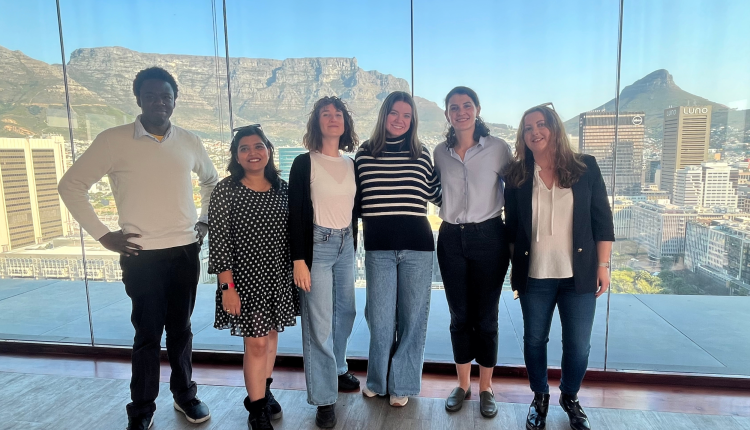On an international reporting trip to Cape Town, South Africa, ICFJ Health Innovation Fellow Priscilla Lynch documented both the successes and challenges of healthcare facilities that are managing to provide essential services to South Africans amid difficult circumstances.
A highlight of this trip was her visit to the Ivan Toms Centre for Health, a men’s clinic that specializes in providing comprehensive sexual health and wellbeing services. The health journalist and editor from Ireland spoke with leading clinicians to learn about the center’s innovative approaches to overcoming stigma, discrimination and barriers to care in providing widespread HIV screening and treatment. Today, the center is one of the largest providers of pre-exposure prophylaxis (PrEP) in South Africa, and a key training institution for service providers across 11 African countries.
The story, published in The Medical Independent, was made possible by the International Center for Journalists’ Health Innovation Journalism Fellowship, which provides grant funding, training and individual mentorship to advance innovative storytelling in health-related journalism. This program is funded through a grant from the Bill & Melinda Gates Foundation.
Twelve journalists and academics from nine countries participated in the fellowship this year. The program included two international reporting trips, with half the fellows traveling to Stockholm, Sweden, and the other half to Johannesburg and Cape Town, South Africa.

Over the course of their fellowships, participants were expected to report on and publish five original articles. So far, they have produced stories on topics including immunotherapy innovation, the reach of telemedicine, and responses to antimicrobial resistance. For example:
- Grace Browne (Ireland), “The Next Generation of Cancer Drugs Will Be Made in Space.” (Published by WIRED, UK): Explores the role of zero-gravity in developing injectable immunotherapy drugs used to fight cancer. Instead of intravenous drip infusions, crystallizing the proteins of the medicine in space without the planet’s gravitational pull allows scientists to formulate the drug in small-volume doses that are suitable for injection.
- Ana Bottallo (Brazil), “Telemedicine provides access to healthcare for isolated indigenous people for the first time.” (Published by Folha de S.Paulo, Brazil): Explores the impact of the TeleNordeste telemedicine operation that launched in Brazil in 2022. The investigation found that the program, which has already conducted 53,000 virtual health consultations, has particularly helped to reach Brazil’s remotely-located Indigenous populations — providing essential consultation in the fields of pediatric neurology, endocrinology, rheumatology, neurology, pulmonology, cardiology and psychiatry.
- Cecilia Butini (Spain), “Drug-resistant bacteria are killing more and more humans. We need new weapons.” (Published by Vox, USA): Details the growing threat of antimicrobial resistance, which is contributing to millions of deaths every year from infections that have become resistant to antibiotic treatment. In light of this danger, scientists around the world are working to devise possible alternative treatments, utilizing artificial intelligence, nanotechnologies and novel biotechnology.
When reflecting on their fellowship experiences, the journalists said that this opportunity greatly impacted their reporting. Cecilia Butini, a freelance journalist based in Spain, shared that “receiving external support and the time needed to work on complex stories is invaluable. Being an ICFJ Health Innovation Fellow gave me this while also allowing me to strengthen my authority on the health beat. And that is how I was able to recently report on two important health stories in a country I didn’t have previous experience in.”
Ana Bottallo, health reporter at Folha de São Paulo in Brazil, said: “The Health Innovation Fellowship from ICFJ has allowed me to explore new techniques and tools for audience engagement and for the dissemination of scientifically accurate, well-investigated and relevant information that may shift the way the public understands healthcare and health innovation.”
Priscilla Lynch, the aforementioned health journalist from Ireland, said: “As a mid career journalist who has 20 years experience covering the healthcare sector, the fellowship has really revitalized and inspired me, and updated my skills and contacts. The field trip to South Africa was a wonderful experience both professionally and personally, and has motivated me to continue to report further on innovation in healthcare beyond the fellowship."
Additional stories that have been published as a result of this fellowship (as of July 2024):
- "Telemedicine services in the country grow 172% in 2023 after law regulating digital health" (Ana Bottallo)
- “Hate injections? Engineers are trying to end them forever” (Grace Browne)
- “How engineers are trying to build better brain implants” (Grace Browne)
- “When antibiotics fail: More people seek bacteriophage therapy in Georgia” (Khatia Shamanauri)
- “Breakthroughs and challenges in therapeutic cancer vaccines: A new era of hope?” (Priscilla Lynch)